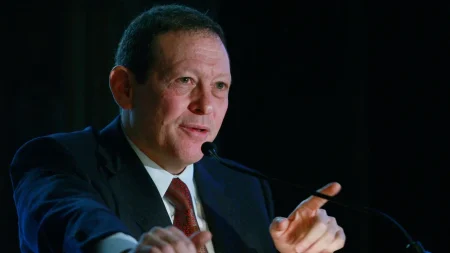Napster’s Fall from Grace: A Tale of Unfulfilled Promises and Vanishing Billions
On November 20, a somber virtual meeting of Napster shareholders delivered the news many had feared: the mysterious $3.36 billion investment the company had touted since January was not going to materialize. CEO John Acunto addressed approximately 700 of the company’s 1,500 shareholders, including current and former employees, to reveal that the much-anticipated windfall—which would have represented one of the year’s largest fundraising events at a staggering $12 billion valuation—had collapsed. In an email following the meeting, Napster described itself as a “victim of misconduct” and mentioned it was “assisting law enforcement with their ongoing investigations.” The promised tender offer that would have allowed shareholders to cash out their stakes was also canceled, marking the fourth time since 2022 that such an opportunity had been dangled before investors only to be withdrawn. This latest disappointment left shareholders with larger percentage stakes in a company whose actual value now seemed increasingly questionable.
The troubling saga of Napster’s finances began drawing serious scrutiny in early 2024. In January, the company (then called Infinite Reality) reached out to Forbes announcing its multi-billion-dollar financing round. By February, they were pitching Acunto as a “prime candidate” for the Forbes billionaires list, with the CEO boldly claiming at a Los Angeles event, “Do you really think that we would talk about $3 billion dollar investments and be one of the largest companies in our space if we really weren’t doing what we’re doing?” He even boasted about creating “over 600 millionaires” among the company’s shareholders. These grand proclamations prompted Forbes to investigate further, uncovering a concerning pattern: lawsuits from unpaid creditors, a federal lawsuit regarding SEC subpoena compliance, and exaggerated claims about partnerships with high-profile organizations like Manchester City Football Club and Google. Meanwhile, Napster’s spokesperson maintained that the $3 billion investment was “in an Infinite Reality account and is available to us” and that they were “actively leveraging” it.
The path to the current crisis is a labyrinth of corporate maneuvers dating back to 2019, when Acunto purchased a bankrupt social media company called Tsu. What followed was a series of acquisitions and mergers with struggling companies in the metaverse, virtual reality, drone, and AI sectors—transactions largely conducted using company stock at increasingly inflated valuations. In March 2024, the company, then operating as Infinite Reality, acquired the music streaming service Napster for $207 million and rebranded itself under this recognizable name by May. Around this time, shareholders report that Acunto was claiming they would soon be able to sell their shares at $20 each, implying an $18 billion valuation—approximately 240 times the company’s projected 2024 revenue and 50% higher than even the January valuation claims. Despite this optimistic narrative, the company continued its acquisition spree while pivoting from metaverse technology to AI.
As weeks passed without tangible evidence of the major investment, cracks began appearing in Napster’s facade. More lawsuits emerged alleging non-payment, including one from the original owners of virtual reality company Obsess, who claimed they were still owed $22 million from an acquisition in January. Sony filed suit in August for $9.2 million in damages from allegedly unpaid royalties and fees, a case in which Napster didn’t even respond, resulting in a certificate of default. The company’s internal challenges became public in July with a significant round of layoffs affecting an estimated one-third of staff—around 100 employees, primarily developers. One former employee questioned the substance behind the company’s product announcements, describing them as “ChatGPT word salad.” By September, both the chief legal officer and chief financial officer had departed, further signaling trouble within the executive ranks.
Throughout this period, Napster appears to have been desperately seeking cash to maintain operations, working with brokers and investment advisors—some with troubling regulatory histories. Cova Capital, which claimed to represent the mystery investor, had previously been sanctioned by FINRA for recommending private share sales to retail investors without conducting proper due diligence. Cova employee Vincent Sharpe had paid fines to settle customer disputes regarding misrepresentation and unsuitable investment recommendations at a previous firm. Even more concerning, Laren Pisciotti, who was charged by the SEC for her role in a separate $120 million fraud scheme last year, appears to have helped Napster raise funds, including high-interest short-term loans in 2024. Despite these questionable associations, the company apparently raised tens of millions in additional capital after announcing the $3 billion investment that never materialized.
The consequences for Napster could be severe if it’s determined that the company knowingly misrepresented its financial situation. According to startup lawyer Patrick McCloskey, if Napster was “lying to the investor to induce the investor to buy securities…that would be fraud.” Both the Securities and Exchange Commission and Department of Justice are reportedly investigating aspects of the situation, with the SEC’s original inquiry into the company’s $1.85 billion valuation from a scrapped 2022 reverse merger potentially broadening in scope. While Napster now positions itself as a victim, the ultimate question remains whether the company genuinely believed it had secured the funding or deliberately misled investors and acquisition targets to keep its operations afloat. For the hundreds of shareholders and employees caught in this web of promises and disappointments, the only certainty is that the mystery of Napster’s phantom billions remains unsolved, leaving behind shattered dreams and a cautionary tale about the dangers of unbridled corporate hype in today’s investment landscape.










